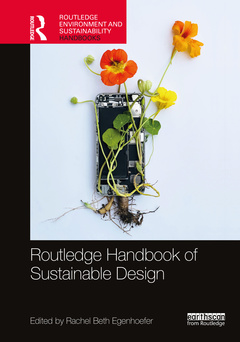Routledge Handbook of Sustainable Design (2nd Ed.) Routledge Environment and Sustainability Handbooks Series

The Routledge Handbook of Sustainable Design considers the design, not only of artifacts, but of structures, systems, and interactions in the context of sustaining our shared planet. This revised edition introduces new and updated chapters, as well as a new section on pedagogy for sustainable design. With authors from around the world, design is positioned in context with recent crises such as global pandemics, racial reckoning, political unrest, and natural disasters. Just as design is an interdisciplinary field, the climate crisis is deeply tangled in racial justice, gender justice, global health, economics, trade, and more. Divided into six sections, it presents a holistic approach to understanding the many facets of sustainable design:
- Part 1: Systems and Design
- Part 2: Complexities of Sustainable Design
- Part 3: Community Engaged Design for Local and Global Diversity
- Part 4: Design for Sustainable Behaviors
- Part 5: Design Futures
- Part 6: Pedagogy in Design for Sustainability
Arguing that design needs to restore, regenerate, and rejuvenate our planet and people, this handbook will be invaluable to researchers, students, and practitioners across all subdisciplines of design, architecture, business, energy management, visual arts, and environmental studies, among others.
Introduction 1. Sustainable Design is Not Sustainable Part 1: Systems and Design 2. The Political Economy of Design in a Hotter Time 3. Design for Sustainability: Reflections on a Dynamically Evolving Field 4. Systems Thinking for Design 5. Sustainable Design for Scale 6. Ecological Theory in Design: Participant Designers in an Age of Entanglement 7. Systems and Service Design and the Circular Economy 8. Surrendering to the Ocean: Practices of Mindfulness and Presence in Designing Part 2: Complexities of Sustainable Design 9. Gullible Consumers: The Contradictions of Sustainability 10. Fashion, the City, and the Spectacle: Expanding the Role of the Designer 11. Biomimicry: Nature Inspiring Design 12. Plastics in Transition: Searching for More Sustainable Plastics 13. Critical Jugaad: Sustainable Design Practices from the Global South 14. Data Clouds and the Environment 15.Life Cycle Thinking and Sustainable Design for Emerging Consumer Electronic Product Systems Part 3: Community-Engaged Design, Local and Global 16. Empathy, Values, and Situated Action: Sustaining People and Planet Through Human Centered Design 17. Global Perspectives for Sustainable Design 18. Design for Localization 19. Intercultural Collaborations in Sustainable Design Education 20. Confronting the Six Paradoxes of Humanitarian Design 21. Co-Designing for Development 22. Empowering Community Members Through Design 23. Practicing Empathy to Connect People and the Environment Part 4: Design for Sustainable Behaviors 24. An Introduction to Design for Sustainable Behaviour 25. How Design Influences Habits 26. The Temporal Fallacy: Design and Emotional Obsolescence 27. Discourse Design: The Art of Rhetoric and Science of Persuasion 28. Using Data Visualization to Shift Behaviors 29. Nature Based Design for Health and Well-Being Promoting Cities 30. Securing Sustainability: Culture and Emotions as Barriers to Environmental Change Part 5: Design Futures 31. The Structure of Structural Change: Making a Habit of Being Alienated as a Designer 32. Transition Design: Wicked Problem Resolution as a Strategy For Catalyzing Positive, Systems-Level Change 33. Letting Go in Sustainability Transitions: Designing Spaces for the Unavoidable Companion of Change 34. Shapes of Satisfaction: Rethinking Design and Designing for an Ecological Economy 35. Designing Speculations for Sustainable Futures 36. ReFuturing: New prompts for new ecological visions 37. A Systemic Approach and Typology for Identifying Natural Nonhuman Stakeholders When Designing for Sustainability 38. Investigative Mingas: An Approach to Designing Sustainable, Pluriversal Futures 39. Interspecies Design for Co-existence Part 6: Pedagogy in Design for Sustainability (DfS) 40. Teaching Design for Sustainability from Product Design to Design for Sustainability Transitions: A New Programme at Brunel University London 41. Building Competence in Design Strategies that Contribute to a Circular Economy: Strategies for Education 42. Mindsets of Possibility 43. Design Ecologies Exercise: The Innovation Landscape Matrix 44. BCI Sessions: Be, Contemplate, Imagine 45. Contextualizing Your Design Practice: Two Exercises for Design Students 46. Pedagogy of Hope for Sustainable Design 47. Sustainable Design Manifestos: Reflections, Reviews, and Calls to Actions
Rachel Beth Egenhoefer is a design educator, sustainability and systems researcher, strategy consultant, and critical maker who uses design as a tool for social change. Her work focuses on shifting the narrative from sustainable design to regenerative, intersectional, systems change for the masses. She encourages regenerative actions to restore, rejuvenate, and reenergize ourselves, our communities, and our planet. Egenhoefer is a full professor in design at the University of San Francisco. She works to bridge academic speak, the design industry, and climate science to create lasting change for the everyday.
Date de parution : 04-2024
17.4x24.6 cm
Mots-clés :
sustainable design; design for sustainability; green architecture; environmental studies; sustainable product design; sustainable urban studies; circular economy; design for development; collaborative consumption; biomimicry; humanitarian design; Racial justice; Regenerative design; Climate crisis; Communities; Systems thinking; Product design



